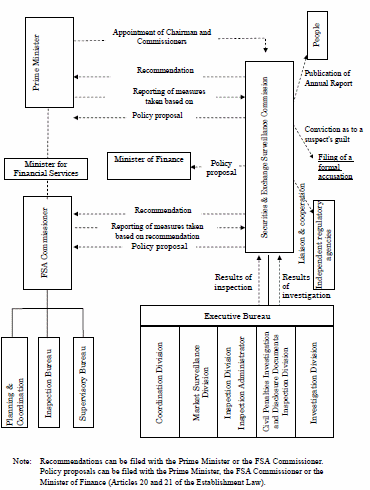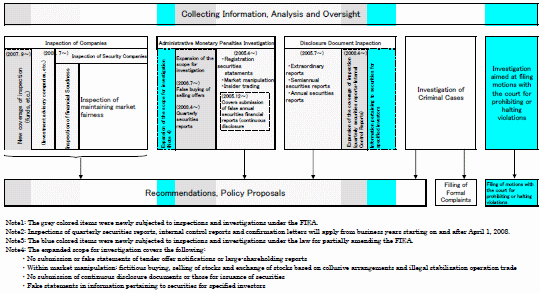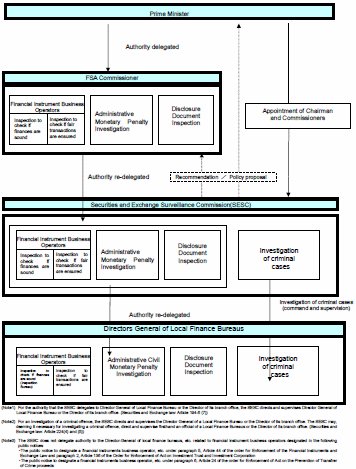Annual Report on the SESC's Activities
1. Introduction
The Securities and Exchange Surveillance Commission (hereinafter referred to as "SESC") is required to publish an annual report on its activity under Article 22 of the Act for Establishment of the Financial Services Agency. In line with this requirement, the SESC published its annual report for the period from July 1, 2007 to June 30,2008 (hereinafter referred to as "Business Year 2007") .This is the 16th such report to be issued by the SESC since its establishment.
1. Outline
In response to the various results of financial system reform and other reform measures, as well as advances in information technology (IT), drastic changes are taking place in the financial and capital markets, including growth in Internet and cross-border transactions and increases in complex transactions involving investment funds, etc.
Amid these changes, SESC's market surveillance has also been strengthened and expanded. In particular, in 2005, SESC was granted the authority to conduct inspections on information disclosures, financial health and other data for securities companies, etc., and into investment trust and investment counseling service businesses, etc., in addition to its existing operations of investigating into regulations violation cases and into fairness in transactions by securities companies, etc., and to the newly introduced inspection of transaction charges. The scope of SESC inspections have been expanded dramatically, newly including inspection of business operators dealing with foreign exchange margin trading as financial futures trading firms.
Furthermore, the new chairman and two commissioners took office in July 2007, and its new medium-range policy "Towards Enhanced Market Integrity - Policy Statement of New SESC" was issued. Activity is currently underway to achieve the two goals of the policy statement, which are to realize market oversight with outstanding versatility and strategic focus and to strengthen discipline and order in the market.
(Market Surveillance)
The SESC received a total of 5,841 pieces of information from the general public such as investors in Business Year 2007.
Meanwhile, the number of oversight cases handled by the SESC in Business Year 2007 totaled 1,096, which represented an increase by 59 cases over the previous business year and an all-time high since SESC's establishment in 1992.
Furthermore, SESC is also paying broad attention to transactions that cannot necessarily be immediately classed as infringing regulations and is working on comprehensive and timely market oversight, including prioritized analysis of issues that underlie specific transactions and market trends.
(Inspections of Securities Companies and Other Entities)
The SESC completed 219 inspections, the highest number since its establishment, and recommended administrative disciplinary actions to 28 out of the 122 companies regarding which the SESC found problems. Particularly notable is that the SESC conducted a special inspection on selected inter-industry themes that are marketrelated issues and topics of interest in Business Year 2007, with selection of inspection targets based on common issues (verification of the risk management organization, etc. at securities companies, in relation to OHT stock credit risks, verification of the financial health of foreign exchange margin traders, with attention to risk management, etc. and others), in addition to existing inspections executed with comprehensive attention to reference data, and information gathered, etc. regarding inspection targets.
(Recommendations and Formal Complaints Unfair Trading)
Regarding recommendations relating to unfair trading, the SESC recommended the issuance of an order for the payment of administrative monetary penalties in 21 cases (all concerning insider trading). These included cases wherein a transaction was based on internal information of an audited business that was gained by a certified public accountant in the course of an audit (insider trading by employee of Ernst & Young ShinNihon LLC), trading was done prior to public offering, based on important information found in broadcast script in an information terminal by employees of a media company (insider trading by NHK employees) and other cases that pose problems in the professional ethical code of those with access to vital information of companies listed in stock exchanges and in the information management systems of corporate entities.
The SESC filed formal complaints of unfair trade in 8 cases, namely, 2 cases on spreading of rumors and on suspicion of fraudulent means or devices, 4 on suspicion of market manipulation and 2 on suspicion of insider trading. SESC has been working on conducting inspections effectively and efficiently in cooperation with other investigative organizations, depending on case circumstances, represented by a joint criminal investigation with the Osaka Prefectural Police on the fraud case pertaining to acquisition of ICF stocks.
(Recommendations and Formal Complaints Disclosure)
Regarding disclosure-related actions, the SESC recommended the issuance of an order for payment of an administrative monetary penalty of 1,594,579,999 yen, the highest amount ever, on June 19, 2008 (for submission of false financial information in securities report, etc., related to IHI Corporation), as well as 9 other administrative monetary penalties issued for falsification on disclosure documents.
In formal complaints related to disclosure, complaints on violation of the Securities and Exchange Law (FIEL) were issued in 2 cases involving 9 persons (Access and IXI cases) for submission of false securities reports, etc.
(Policy Proposal)
Although there was not any specific policy proposal made in Business Year 2007, the SESC has stated its opinion on raising surcharge levy standards, etc. based on the current state of implementation and management of the administrative monetary penalty system, at the Financial System Council. The opinion has been applied in the amended Financial Instruments and Exchange Act enacted on June 6, 2008, and has produced an effect similar to submitting a policy proposal.

Conceptual Chart for Supervision of Securities Transactions
Conceptual Chart of Relationship among the Prime Minister, FSA Commissioner, SESC, and Directors General of Local Finance Bureaus
Report on Activities of the Certified Public Accountants and Auditing Oversight Board (Business Year 2007)
The Certified Public Accountants and Auditing Oversight Board(CPAAOB) publishes the annual report on its business year activities at the end of each business year and published its report for Business Year 2007 (from July 2007 to June 2008) on August 28, 2008. The report is outlined as follows:
• Reviews of the "quality control review" and inspections
Business Year 2007 is the first year of the second term (Business Years 2007-2009) of the CPAAOB. Based on achievements in the first term (Business Years 2004-2006), the CPAAOB is working to establish improvements at audit firms related to issues on quality control that had been identified at each audit firm.
Specifically, quality control reviews of the Japanese Institute of Certified Public Accountants for 2006 and 2007 were reviewed, with inspections conducted on 11 audit firms. This has resulted on recommendations to the Commissioner of the Financial Services Agency to take disciplinary actions and other measures against 5 audit firms.
In order to promote firms' efforts to improve their audit quality through their own initiatives, a list from among those identified in past inspection results of audit firms which can be regarded as useful for audit firms to improve their quality control system were compiled as a " List of examples of issues on audit quality control identified through inspections " and published in February 2008. It has been presented and explained at briefings held at local CPA associations across Japan.
•CPA Examinations
Examinations were conducted for 2007 (multiple choice test & essay test) and for 2008 (multiple choice test).
In addition, the CPA examination study group was set up under CPAAOB to examine into making improvements in implementation of the CPA examinations. CPAAOB published the findings in "Improvements in the CPA Examinations" in October 2007.
Improvement measures are being implemented, including the shortening dates of the multiple choice tests from two days to one, as well as widening the subjects for the essay test using the provided booklets on laws and standards from two to five subjects, in the 2008 CPA examinations.
* Also, the multiple choice test is scheduled to be conducted twice a year of the 2009 CPA examination.
• Cooperation with relevant organizations in other countries
The International Forum of Independent Audit Regulators (IFIAR) was established in March 2007 for the purpose of information exchange, etc. among audit regulators in various countries. The second meeting was held in Toronto, Canada in September 2007, and the third meeting held in Oslo, Norway in April 2008. The CPAAOB was represented by its chairman and one of commissioners, who contributed actively to the Forum.
This section provides information regarding the hot topics of the moment, selected from questions and answers given at the Minister's press conferences, etc.
If you wish to find out more, we invite you to visit the "Press Conferences" section of the FSA website.
Q: I would like to ask you about the current state of the global financial markets. While some people expect that stability will be restored to the markets following the U.S. government's announcement of a scheme to use public funds, the short-term money market remains in a state of turmoil. Firstly, how do you view the current state? Secondly, with what stance - you said earlier that the damage done to Japan's financial system is not so heavy - are you going to attend a G-7 meeting scheduled for next month?
A: First, I am not saying that the impact of the subprime mortgage problem, which has been continuing for one year, on Japan's financial system and real economy is small. I am saying that Japan has learned lessons from its past crisis and received limited damage this time compared with the United States and Europe, so we need to carefully watch future developments. Also, I understand that Japan is providing short-term funds, and it is very important that countries around the world cooperate with one another in this regard. At the Prime Minister's Office, there was talk about what French President Sarkozy has suggested. Regardless of whether we should immediately go so far as was suggested by him, it is very important that G-7 members, developed countries and other nations that have a certain level of financial scale or influence cooperate with one another, and it is necessary for them to make a very agile response.
[Extract from the press conference following the first cabinet meeting on September 25, 2008]
Q: In a speech before the U.N. General Assembly, Prime Minister Aso said that Japan wants to contribute its experiences and knowledge to debates over the international financial system. What do you think needs to be improved regarding the system and what will be the key points of the debates?
A: As has been pointed out, Japan experienced more than 10 years of severe financial and economic hardship after the bursting of its economic bubble 20 years ago. I understand that Japan overcame its financial crisis through its own experiences of this painful period. In one sense, what was done in Japan may serve as a precedent for a solution to the situations of the United States and other suffering countries. Therefore, if Japan offers its experiences as a reference for others, it may contribute to a quick solution. Furthermore, in this crisis in particular, it is very important that the G-7 members and other countries around the world closely cooperate with one another. The Prime Minister is now in New York, and the U.S. government and Congress are apparently working together on bold measures, so the most important thing for Japan and other individual countries to do now, is to assertively do what they can on their own and actively cooperate in doing what they can do together.
[Extract from the press conference on September 26, 2008]
[Information]
The FSA has started an E-mail Information Service. If you register your e-mail address on the Subscribe Page of the FSA website, we will notify you by e-mail once on each day when new information is posted on our website. For details, please access Subscribing to E-mail Information Service of the FSA website.
Site Map
- Press Releases & Public RelationsPage list Open
- Press Releases
- Press Conferences
- Official Statements
- FSA Weekly Review & ACCESS FSA
- Speeches
- For Financial Users
- Others
- Archives
- Laws & RegulationsPage list Open
- Name of Laws and Regulations(PDF)

- Recent Changes (Legislation, Ordinances, Guidelines)
- Guidelines
- Financial Instruments and Exchange Act
- Financial Monitoring Policy
- Public Comment
- No-Action Letter System
- Procedures concerning Foreign Account Management Institutions








